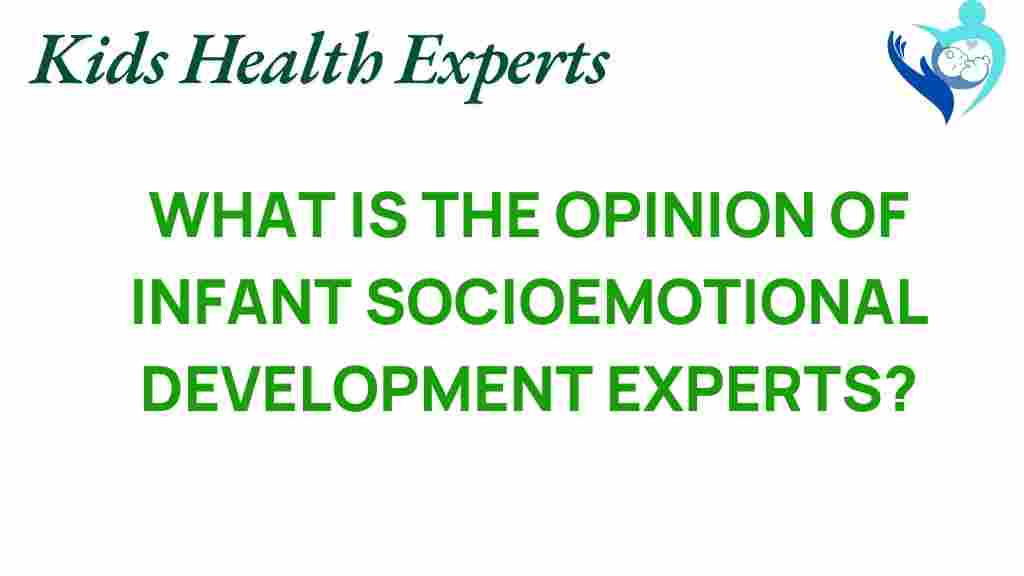Unveiling Expert Insights on Infant Development
Understanding the nuances of infant development is crucial for parents, caregivers, and educators alike. Among the various dimensions of development, socioemotional growth plays a pivotal role, shaping how infants interact with the world around them. In this article, we will delve into the insights provided by child experts on socioemotional development, share valuable parenting tips, and outline essential developmental milestones that every caregiver should be aware of. We will also explore the concept of emotional intelligence and its importance in early childhood.
Understanding Socioemotional Development
Socioemotional development refers to the process through which infants and young children develop the ability to experience, express, and manage emotions, as well as the ability to establish positive relationships with others. This aspect of infant development is crucial for overall well-being and has long-lasting effects on a child’s future interactions and emotional health.
Child experts agree that the early years are foundational for building a child’s emotional intelligence, which encompasses self-awareness, empathy, and social skills. As infants grow, they begin to form attachments, recognize emotions in others, and learn how to respond to various social situations.
Key Developmental Milestones in Socioemotional Growth
- 0-3 Months: Infants begin to express basic emotions such as joy and distress. They respond to faces and voices, especially those of their caregivers.
- 4-6 Months: Babies start to exhibit social smiles and can show interest in other children. They engage in reciprocal interactions.
- 7-12 Months: Attachment to primary caregivers strengthens. Infants may exhibit separation anxiety and show preferences for familiar individuals.
- 1-2 Years: Toddlers begin to show a wider range of emotions, including fear and frustration. They start engaging in parallel play with peers.
- 2-3 Years: There is an increase in cooperative play and sharing. Children begin to express empathy and can identify some emotions in themselves and others.
Expert Opinions on Fostering Socioemotional Development
According to leading child psychologists and experts in early childhood education, there are several strategies parents can employ to foster healthy socioemotional development in their infants:
- Responsive Parenting: Responding promptly and appropriately to an infant’s needs helps to build a secure attachment, which is vital for emotional growth.
- Encouraging Emotional Expression: Allowing children to express their feelings openly and validating those emotions fosters emotional intelligence.
- Modeling Social Interactions: Demonstrating positive social behavior and interactions provides infants with a roadmap for their own behavior.
- Creating a Safe Environment: A nurturing and safe home environment encourages exploration and social interaction, essential for socioemotional growth.
Step-by-Step Process for Supporting Infant Socioemotional Development
To effectively support infant development in the realm of socioemotional growth, consider following this step-by-step approach:
Step 1: Build Secure Attachments
Secure attachments are foundational for emotional intelligence. To build these attachments:
- Engage in regular physical affection, such as hugging and cuddling.
- Respond to your infant’s cries and needs promptly.
- Maintain eye contact during interactions to strengthen bonds.
Step 2: Encourage Emotional Literacy
Teach your child to recognize and express emotions. You can do this by:
- Using simple language to label emotions (e.g., “happy,” “sad,” “angry”).
- Reading books that depict various emotions and discussing them.
- Encouraging your child to express their feelings verbally.
Step 3: Promote Social Interaction
Facilitate opportunities for your child to interact with peers and adults:
- Arrange playdates with other children.
- Participate in community programs or classes that encourage socialization.
- Model positive social interactions with friends and family.
Step 4: Create a Routine
Establishing a daily routine can provide a sense of security and predictability. This can help infants feel more comfortable exploring their environment and engaging with others.
Troubleshooting Common Challenges
Despite best efforts, parents may encounter challenges in fostering their infant’s socioemotional development. Here are some common issues and expert-recommended solutions:
- Separation Anxiety: This is common as infants grow. To alleviate this, practice short separations and gradually increase the duration.
- Difficulty Sharing: If toddlers struggle with sharing, encourage taking turns during playtime and praise them when they do share.
- Overstimulation: If your child seems overwhelmed, create a calming environment and allow them to have quiet time away from stimuli.
Parenting Tips for Enhancing Socioemotional Growth
To further enhance your child’s socioemotional growth, consider the following parenting tips:
- Engage in play that encourages cooperation and teamwork.
- Use storytelling to illustrate social situations and appropriate emotional responses.
- Practice mindfulness activities together, such as deep breathing or nature walks, to enhance emotional regulation skills.
Resources for Parents
For more information on infant development and socioemotional growth, parents can explore various resources:
- Child Development Institute – Offers a wealth of information on child development, including socioemotional aspects.
- American Academy of Pediatrics – Provides guidelines and articles on various parenting topics.
Conclusion
In conclusion, understanding and supporting infant development, particularly in the area of socioemotional growth, is essential for fostering emotional intelligence and healthy relationships in early childhood. By implementing the expert insights and strategies discussed in this article, parents can play a significant role in their child’s socioemotional well-being. Remember, every child develops at their own pace, and nurturing their emotional and social skills lays the groundwork for a successful future.
This article is in the category Growth and created by KidsHealthExperts Team
